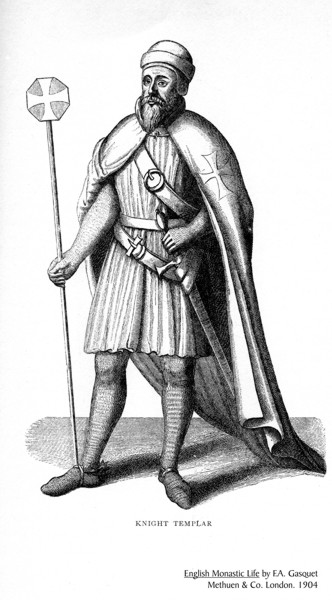|
Web information about the
Military Orders, Hospitallers (Hospitalers)
and Templars, can get a little nutty. It was probably less nutty
prior
to the publication of Dan Brown's Da Vinci Code...but then, there it
is. I have attempted to find reputable history sites for my
links. My
intent here is to get to the basics and not spin out too crazily across
the universe. The core of this page is comprised of information
from
Abbot
Gasquet's book English
Monastic
Life. Gasquet published the book through The Antiquaries
Book
series in
1904. It is now out of print and not generally available.
There may
be a number of factual errors in the text, or points on which
historians or theologians do not agree. Gasquet's
text, notes & links>>
|
 |
|
The Templars
The Military
Order of the Templars was founded, according to Tanner, about the year A.D.
1118. They derived their name from the Temple
of Jerusalem, and the
original
purpose of their institute was to secure the roads to Palestine,
and protect the holy places. They must
have come into England
early in the reign of King Stephen, as they had several foundations at
this
time, the first being that in London
which gave its name to the present Temple. They became too right and powerful ; and
having been accused of great crimes, their Order was suppressed by Pope
Clement
V in 1309 : an act which was confirmed in the Council of Vienne in 1312. The head of the Order in England
was styled the “Master of the Temple,”
and was sometimes, as such, summoned to Parliament.
Upon
there manors and estates the Templars, like the Hospitallers,
frequently built
churches and houses, in which some of the brethren lived.
These were subordinate to the London
house and were in reality cells, under the title of “Preceptories.” On the final suppression of the Order, their
lands and houses, to the number of eighteen, were handed over to the
Knights of
St. John of Jerusalem. One house,
Ferriby, in Yorkshire, became a priory of
Austin Canons,
and four other estates appear to have been confiscated.
In all there were some three-and-twenty
preceptories connected with the London
Temple.
English
Monastic Life by
F.A. Gasquet. (pages 231.)
|
Templar Houses in England (For more English
Religious Houses, see the index page):
|
Grantham
|
Templar only
|
Lincoln.
|
|
Newsom
Temple
|
Templar only
|
Yorks.
|
|
Saddlescombe
|
Templar only
|
Sussex.
|
|
Aslakeby
|
Templar & Hospitaller
|
Lincoln
|
|
Badersley(South)
|
Templar & Hospitaller
|
Hants.
|
|
Balsall
|
Templar & Hospitaller
|
Warwick.
|
|
Cressing (Temple)
|
Templar & Hospitaller
|
Essex.
|
|
Dimsley (Temple)
|
Templar & Hospitaller
|
Herts.
|
|
Eycle (see Egle)
|
Templar & Hospitaller
|
Lincoln.
|
|
Gislingham
|
Templar & Hospitaller
|
Suffolk.
|
|
Halston
|
Templar & Hospitaller
|
Salop.
|
|
Maltby, or Louth (see Temple Maltby)
|
Templar & Hospitaller
|
Lincoln.
|
|
Mere (see Temple Mere)
|
Templar & Hospitaller
|
Lincoln.
|
|
Rebston
|
Templar & Hospitaller
|
Yorks, W. R.
|
|
Rotheley
|
Templar & Hospitaller
|
Leicester.
|
|
Swinfield
|
Templar & Hospitaller
|
Kent.
|
|
Temply Bruer (Bruerne)
|
Templar & Hospitaller
|
Lincoln.
|
|
Temple
Covele
|
Templar & Hospitaller
|
Oxford.
|
|
Temple
Dynesley
|
Templar & Hospitaller
|
Herts.
|
|
Temple
Egle
|
Templar & Hospitaller
|
Lincoln.
|
|
Temple
Hirst
|
Templar & Hospitaller
|
Yorks, W. R.
|
|
Temple
Maltby
|
Templar & Hospitaller
|
Lincoln.
|
|
Temple
Mere
|
Templar & Hospitaller
|
Lincoln.
|
|
Temple
Newsam
|
Templar & Hospitaller
|
Yorks, W. R.
|
|
Temple
Rockley
|
Templar & Hospitaller
|
Wilts.
|
|
Temple
Standon
|
Templar & Hospitaller
|
Herts.
|
|
Temple
Witham
|
Templar & Hospitaller
|
Lincoln.
|
|
Temple
Wilcketone
|
Templar & Hospitaller
|
Lincoln.
|
|
Warwick
|
Templar & Hospitaller
|
Warwick.
|
|
Wilburgham, Great
(Wilbraham)
|
Templar & Hospitaller
|
Cambridge.
|
| <>Witham, or South
Witham (see Temple
Witham) |
Templar & Hospitaller
|
Lincoln.
|
Not mentioned in
this list is the hermitage known as Royston Cave, see my
blog on the subject.
|
Templar Links:
Knights Templar, a
hobbiest site with a lot of information, from Anne Veling.
Corrections,
questions?  |
|
Historyfish
pages, content, and design copyright (c) Richenda
Fairhurst, 2008
All rights reserved. No commercial permissions are
granted.
The Historyfish site, as a particular and so
unique "expression," is copyright. However, some (most) source
material is part of the public domain, and so free of copyright
restrictions. Where those sections are not clearly marked, please
contact me so I can assist in identifying and separating that material
from the Historyfish site as a whole.
When using material from this site, please
keep
author, source, and
copyright permissions with this article.
Historyfish intends to generate discussion through shared
information and does not claim to provide,
in any way, formal, legal, or factual advice or information. These
pages are opinion only. Opinions shared on historyfish are
not necessarily
the
opinions of historyfish editors, staff, owners or
administrators. Always consult
proper authorities with questions pertaining to copyrights, property
rights, and intellectual property rights.
It is my intent to follow copyright law (however impossibly convoluted
that may be). Please contact me should any material included here be
copyright protected and posted in error. I will remove it from the
site. Thank you. |
|
